Election portal sees broad support and a possible amendment
The State of New Hampshire may have a new online election portal, although there is a still a question of how this new initiative will be paid for.


CONCORD, N.H. – The State of New Hampshire may have a new online election portal, although there is a still a question of how this new initiative will be paid for.
On Tuesday, the New Hampshire House of Representatives Election Law Committee heard testimony on SB 70, a bill that would create a new website that would allow New Hampshire voters to go online and complete voter registration applications, request an absentee ballot, change their party registration and obtain other election-related information.
New Hampshire is currently one of only eight states without some sort of online voting registration portal. The cost of the portal is expected to come in somewhere between $1 and 4.5 million according individuals that testified on Tuesday.
Comparable bills failed in 2020, 2022 and a similar bill starting in the house earlier this year was retained.
Senate Election Law Committee Chair James Gray (R-Rochester) began testimony in favor of the bill, which was recommended the Senate Election Law Committee by a 5-0 vote.
Gray was followed by 14 people, including various local election officials from across the state, speaking in glowing terms about the importance of the bill for New Hampshire’s elections. Several of those speaking in favor of the bill shared stories of how human error almost cost citizens their right to vote, such as the story from Olivia Zink. Speaking as the Executive Director of Open Democracy and a city councilor in Franklin, Zink said she once met a voter who was registered to vote but almost was not given a ballot because someone accidentally put the second letter of their last name as an “o” rather than an “a.”
“It’s really important that we modernize elections,” she said. “It’s an important step in supporting our local poll workers.”
In addition to eliminating human error that comes from paper forms, people speaking in favor of the bill also praised expected cost savings from eliminating paper forms, increasing accessibility for rural voters and voters with medical conditions who may face registration challenges, and how the portal would prevent a glut of same-day voter registrations that could overwhelm local election officials.
Supporters of the bill also praised that local election officials would also still have oversight of records in their municipalities.
Online testimony for the bill had 189 in support against only one person in opposition.
Election Law Committee Chair Ross Berry discussed an amendment to the bill that would change the funding mechanism for the bill, taking money from Help America Vote Act (HAVA) funding rather than from the state’s general fund, also adding a grant fund for municipalities to replace aging election equipment. The amendment was comparable to HB 447, which was retained in House Election Law earlier this year.
After the first HAVA funding wsa issued in 2003 from the federal government for various election-related expenses and occasionally supplemented with new grant funding, it has been the general policy of the New Hampshire Secretary of State’s Office to reinvest that money and only spend interest earned on that principal funding toward election-related matters. As of this year, the account has risen to approximately $13 million.
Berry said that the investment strategies related to the HAVA funding has not taken inflation into account, meaning that the value of the funding was slowly seeping away, and thus should be spent before more value was lost.
Berry also felt that using HAVA money would force the Secretary of State’s office to be more efficient on the project, referring to it as a “boondoggle” at one point.
He also noted a letter constructed by himself and ranking member Connie Lane (D-Concord) urging the Ballot Law Commission to show more urgency in providing recommendations in updating the state’s aging election equipment during his testimony on the amendment.
Gray spoke in opposition to the amendment, implying that general fund money would be needed to be placed into the HAVA account if new grants could not be obtained from the federal government.
He also said that the Senate may not cooperate in a committee of conference if the amendment was passed given the solid support the original bill had in his chamber.
“Playing tit for tat doesn’t suit me well, but I know how to play,” he said.
Recommendations on the amendment and the bill itself are expected next Tuesday.





